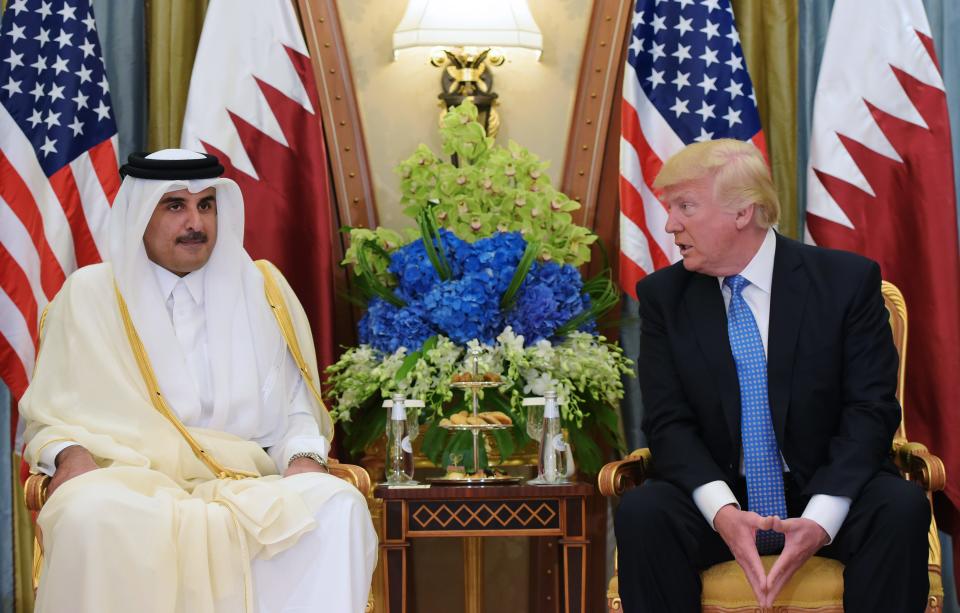To Understand the Qatar Situation, Think Back to Playground Dynamics

When I was a kid, I was not the largest, strongest, most agile, or the fastest. Indeed, I was none of these. This is a dangerous collection of "nots" for any preteen boy. With very few exceptions, I was rarely picked for any team anywhere past the middle of the pack, and if things came to schoolyard violence, I was essentially bereft of personal options. Too weak to grapple, too uncoordinated to jab, and too slow to run away with any hope of success. So, I made alliances.
Against the particularly large and strong fellows I had two allies who were both large, but clumsy, and sometimes a bit socially awkward. I'd befriended them not just because they were big, but also because they actually were nice-but I would be lying if I pretended I wasn't aware of their utility. Against a pack, I had the utility of other friends I'd made outside the usual circle of my own classroom, some of them in (gasp) older classes. For each variation of threat, I had at least a break-even chance that my friends, my allies, would give the bullies reason to pause, if not avoid the issue entirely. Such were the necessary dynamics for somebody like me in a small-town Catholic school in the '70s.
Qatar, a small nation at the edge of the Arabian Gulf, is in much the same spot.
Now, that is not to say they do not have faults. Like me, they have those aplenty. Our host here at the shebeen made note of some of those points in his earlier essay. He was understating the case. Qatar is the number-one producer of CO2 per capita, and the country's civil rights record is about as abominable as, well, most of their neighbors. Add to that the fact that there are only about 350,000 actual Qataris (the other 2.1 million inhabitants are all expats or "guest workers"), and you can see why they are also the richest nation (again, per capita, meaning only residents) in the world.
Sitting atop both crude oil and large reserves of natural gas, Qatar has made the best of their situation since they gained independence from Great Britain in 1971. But there has always been that problem: They are neither big nor strong, and while their 11,000-man military may be "agile," the fact is that they have nowhere to run. So Qatar has pursued a cagey game, particularly in the past twenty years or so. It's a game I recognize, as does any other kid who faced the same situation.

Saudi Arabia is the big kid, far and away more powerful by every measure. This puts the little fellows around them in a fix, each choosing a slightly different route to secure themselves. The United Arab Emirates took a couple of different avenues before settling down on one of near-complete alliance with the Saudis. But they are larger, with a little more space to maneuver.
The tiny island nation of Bahrain traded in on their location, and historic ties to the UK (and then through them to us), serving as a major naval site for western forces. Kuwait, tucked between Iraq, Iran, and Saudi Arabia, became the ultimate double-player. Remember the "Tanker Wars" of the '80s? We sent the US Navy into the Gulf to "defend" the six major oil tankers that the Kuwaitis had reflagged as "American." But did you know that they also reflagged six in the colors of the Soviet Union? Qataris, wanting to be the masters of their own destiny, have traded on much the same basis over the past several decades.
Sharing a common oil-field with the Iranians meant that they had to maintain at least some degree of communication with that nation-state, regardless of who was in charge or which branch of Islam they followed. That really pisses the Saudis off-and so, by extension, it pisses off the UAE and Bahrain.
They are neither big nor strong, and while their 11,000-man military may be "agile," the fact is that they have nowhere to run.
Looking at the powder kegs many Arab and North African states were sitting upon just prior to the Arab Spring, the Qataris saw fit to lend at least tacit support to several of the resultant dissent movements, which put them in the same camp with the Muslim Brotherhood. Its leader, Morsi, was first elected and then was himself deposed.
They're also known for being at least nominally willing to listen to all sides, which is why they are the go-to site if you want to meet with the Afghan Taliban. That spectral entity opened an office there in Doha, the Qatari capital. That's an intriguing development, since the largest US military base in the Middle East is just a few miles down the road at Al Udied, a joint military base used by not only the Qatari military, but also the US and the UK militaries. Indeed, it is our primary (and sometimes only) military base for air-combat operations anywhere in the area, including bombing the Taliban in Afghanistan. They even let us use/land B-52s there, and that is saying something. The Qataris are also brokers of peace-or at least truces-in several other areas where it seems like only the Qataris are willing to talk to everyone.
Oh, and then there is Al Jazeera. It is the first-and in many ways only-really independent news organization in most of the Middle East, with the exception of their reporting on their own little peninsula. Unbiased reportage there is a no-no. But everywhere else in the Arab World? That's fair game. And if you think that Al Jazeera has annoyed some American politicians from time-to-time, let me assure you that doesn't hold a candle to how much they are detested by the powers-that-be in many an Arab nation.

In short, the Qataris took the same path on a national level that I did on the playgrounds, making lots of links to a wide-range of people, groups, organizations, and nations. A dangerous game, one might say, because many of those they are willing to deal with are mutually exclusive, but few options are open to the little guys.
So what triggered this latest brouhaha-the one that's shut Qatar's land borders (Saudi Arabia controls that), has caused families to be torn apart, and threatens to destabilize an already dicey area?
Well, for starters, our president showed up in Saudi Arabia. Apparently, in an effort to suck-up to his new "friends" from the country that supplied most of the 9/11 attackers, he then started tweeting anti-Qatar material. This, it seems, was based mostly upon what Trump "learned" about Qatar not from his own State Department or Department of Defense, but from the Saudis. (A significant caveat here: Talking to everyone, as I earlier noted, probably does mean that they do have contacts with people who wish us ill. They are our "friends" only insofar as we are useful. Let us not fool ourselves on that point. But they are useful to us as well.)
The Saudis are our "friends" only insofar as we are useful.
Russian hackers targeted Qatar and dropped a snowball at the top of a very steep slope. They took semi-control of an official Qatari news outlet and inserted a fake news release about a fake news conference which said everything the Saudis/Bahrainians/Emiritis believed about Qatar but could never prove. It went mega-viral in that part of the world despite Qatar's protests and the emergence of proof (including from our own FBI) that it was not true.
So why did the Russians get involved? With a single planted story and the assistance of a few thousand bots, voila, the Russians threw the country upon which the United States most depends as a base to exert our military influence in, say, Syria, and potentially against Iran, into a pot and turned on the boilers.
It's not a whole lot different from how they influenced the US national elections last year. War: it's not just for the strong anymore. Geeks can get in on it, too.
**By popular demand, I am reposting the entirety of my 2013 Esquire Gettysburg Campaign Series on Twitter. Follow it @RobertLBateman. I'm doing one-per-day so you can see them all before the anniversary. We are on the sixth post now.**
Robert Bateman is a former US Army strategist. He is currently an International Security Fellow at New America. As always he can be reached at R_Bateman_LTC@hotmail.com.
You Might Also Like


